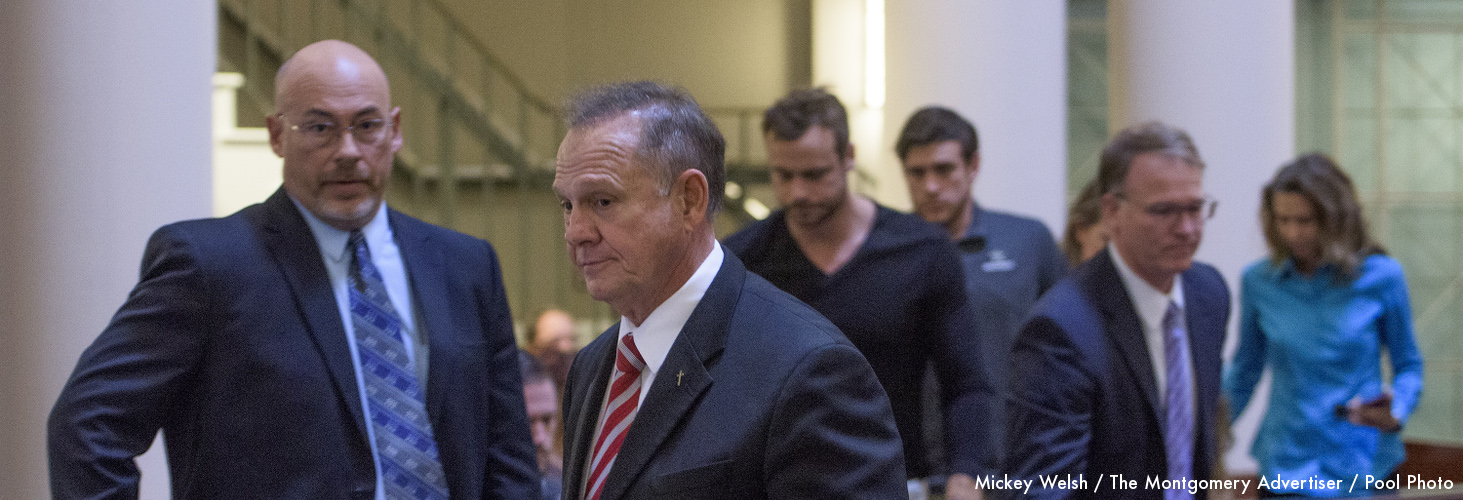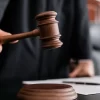By Chip Brownlee
Alabama Political Reporter
MONTGOMERY—On Monday, Gov. Robert Bentley announced the seven members of the Special Supreme Court that will hear Chief Justice Roy Moore’s appeal.
Sitting on the panel, Bentley announced, will be H. Edward McFerrin, a retired circuit judge from Lowndes, Butler and Crenshaw counties; Robert G. Cahill, a retired Jefferson County district judge; William R. King, a retired Crenshaw County district judge; James H. Reid Jr., a retired Baldwin County circuit judge; Lynn Clardy Bright, a retried Montgomery County district judge; Ralph A. Ferguson Jr., a retired Jefferson County circuit judge; and John D. Coggin, a retired Cherokee County district judge.
The Alabama Supreme Court drew 50 names from a pool of retired appellate, circuit and district court judges last Thursday. The names were placed on a list in the order they were drawn, and the first seven judges on the list were those chosen
McFerrin, Cahill, King, Reid, Bright, Ferguson and Coggin were the first names drawn and the first who were willing to serve on the special panel to hear Moore’s ethics appeal.
Late last month, Moore was suspended for the remainder of his term, which will not end until 2019. The Court of the Judiciary, which heard the case, said Moore clearly violated the Alabama Canons of Judicial Ethics by blatantly disregarding federal law in a January 2016 administrative order to the State’s 67 probate judges.
After he was suspended in September, Moore and his attorneys at the Liberty Counsel filed an appeal with the Alabama Supreme Court earlier this month. At the time, Moore said the Court would have to recuse itself and a new court would need to be empaneled to hear the case.
The eight remaining associate justices of the Alabama Supreme Court recused themselves in Moore’s appeal, the Court said in an opinion issued Oct. 24. They also decided the method that was used to pick the new judges.
Associate Justices Tom Parker, Glenn Murdock and Kelli Wise dissented. Parker, who wrote the dissent, said he felt the pool should be gathered from active elective judges who remain accountable to the people of Alabama, not retired judges who can’t be held accountable for their decision in the case.
“The people of Alabama have increasingly called upon their judges to be accountable,” said Mat Staver, Moore’s lead attorney and founder of Liberty Counsel. “At every turn, this case presents new twists and turns that have never occurred in the history of Alabama.”
Last Thursday, the Supreme Court and attorneys for Moore and the Judicial Inquiry Commission met to draw the names for the Special Supreme Court lottery. But before the Court could even draw the names, Moore and his attorney left the courtroom abruptly.
Moore and his attorneys were upset that the Supreme Court refused to rule on a motion to continue. The motion challenged the Court’s authority to select the judges, since they had recused themselves.
But Acting Chief Justice Lyn Stewart refused to rule on the motion because “there’s no court to hear it,” she said. The other justices weren’t there.
Moore and his attorney said Thursday that they would review the names of the seven judges selected and make a decision about “whether there are names that raise conflict of interest concerns.”
“Chief Justice Moore is merely asking for the same thing any citizen is entitled to receive – equal justice under the law,” Staver said. “He is not wanting judges that have a bias for or against him. He wants judges who will follow the rule of law. Politics and ideology have no place in the final outcome of this case.”
Chief Justice Moore has also twice filed motions asking the court to unseal the records. The Alabama Political Reporter filed to intervene earlier this month, seeking an order from the court to unseal the records.
“Under State law, Moore is entitled to a final hearing by the State Supreme Court on the sentence handed down by the Court of the Judiciary,” said APR Editor-in-Chief Bill Britt. “But how can the public have faith in the Alabama Supreme Court if it continues to deny the public their right to examine the records in the case?”
Moore joined APR’s suit last week. Moore previously asked for the press to file a motion to unseal the case, but only APR did so.
“The pubic has a right to know the truth behind these politically-motivated charges and actions from the justices and the Court of the Judiciary,” Staver said of APR’s motion.
Moore became nationally famous for vehemently opposing the US Supreme Court’s 2015 decision in Obergefell v. Hodges, which effectively legalized same-sex marriage in all 50 states. His administrative order told the probate judges that the state’s same-sex marriage ban was still in place, and they should follow State laws instead of federal laws.
Moore said his order didn’t force the probate judges to do anything, instead it was advice and a review of the facts of the case.
If Moore’s suspension is upheld by the Special Supreme Court, his judicial career will be effectively over. He will not be allowed to run again for a Supreme Court seat because State statute prohibits anyone over 70-year-old from running for election for a judicial position.






















































